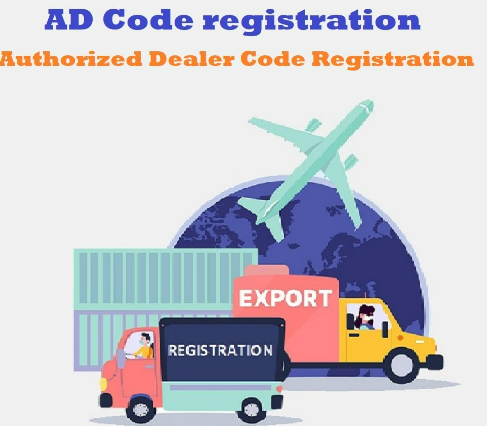AD CODE Registration & Licensing
In the context of international trade and foreign exchange transactions in India, an AD Code (Authorized Dealer Code) is a unique identification code issued by the Reserve Bank of India (RBI) to banks. It is used for processing foreign exchange transactions, including inward and outward remittances, trade payments, and other foreign exchange-related activities.

AD CODE Registration & Licensing
Welcome to muneemG, your trusted partner in navigating the complexities of AD CODE (Contract Labour Regulation and Abolition) registration and licensing. In this comprehensive guide, we will delve deep into the significance of AD CODE Registration & Licensing , the intricacies of the registration and licensing process, key regulatory requirements, challenges faced by businesses, and how muneemG can assist you in achieving regulatory adherence and excellence in managing contract labor
The Contract Labour (Regulation and Abolition) Act, 1970, commonly known as AD CODE , is a seminal piece of legislation in India aimed at regulating the employment of contract labor and ensuring their welfare and rights. The Act applies to establishments where 20 or more contract workers are employed on any day of the preceding 12 months.
Importance of AD CODE Registration & Licensing:
Legal Compliance: AD CODE Registration & Licensing are not just administrative formalities but essential legal requirements for establishments engaging contract labor. Compliance ensures adherence to statutory regulations and avoids legal liabilities and penalties.
Worker Welfare: At the core of AD CODE lies the protection of the rights and welfare of contract workers. Compliance with AD CODE provisions ensures fair wages, decent working conditions, social security benefits, and protection against exploitation and abuse.
Employer Obligations: AD CODE places specific obligations on employers regarding the registration of establishments, engagement of contract labor through licensed contractors, and adherence to prescribed working conditions and welfare measures.
Enhanced Efficiency: Effective management of contract labor through AD CODE compliance contributes to improved productivity, operational efficiency, and labor relations within the organization.
Risk Mitigation: AD CODE registration and licensing help mitigate risks associated with labor disputes, non-compliance with labor laws, and reputational damage to the organization.
AD CODE Registration & Licensing Process: The process of obtaining AD CODE registration and licensing involves several steps to ensure adherence to regulatory requirements and standards:
Preparation of Documents: Gather necessary documents, including application forms, establishment details, contractor information, and supporting documentation.
Submission of Application: Submit the AD CODE registration application to the appropriate authorities, typically the Labour Department or designated regulatory bodies.
Verification & Inspection: Authorities may conduct verification and inspection of the establishment premises to assess compliance with AD CODE regulations, working conditions, and welfare measures.
Approval & Issuance: Upon satisfactory verification, the authorities grant AD CODE registration and licensing, enabling the establishment to engage contract labor through licensed contractors.
Compliance Monitoring: Registered establishments are subject to periodic inspections and compliance audits by regulatory authorities to ensure adherence to AD CODE provisions and welfare measures for contract workers.
Key Regulatory Requirements
AD CODE compliance entails adherence to various statutory provisions and regulatory requirements, including:
Registration of Establishments: Registering the establishment under AD CODE and obtaining the necessary licenses for engaging contract labor.
Engagement of Contractors: Engaging only licensed contractors for the supply of contract labor and ensuring compliance with contractual and regulatory obligations
Payment of Wages & Benefits: Ensuring payment of fair wages, timely disbursement of wages, and provision of statutory benefits, including Provident Fund, ESI (Employees’ State Insurance), and other social security measures.
Working Conditions: Providing safe working conditions, amenities, and welfare facilities for contract workers as per AD CODE guidelines.
Record-keeping & Reporting: Maintaining accurate records, registers, and documentation related to contract labor engagement, wages, attendance, and compliance with regulatory requirements.
Challenges Faced by Businesses:
Complex Regulatory Landscape: The evolving regulatory landscape and frequent amendments to labor laws pose challenges for businesses to stay abreast of compliance requirements.
Contract Labor Management: Managing contract labor effectively while ensuring compliance with AD CODE provisions, contractor agreements, and regulatory obligations can be daunting for employers.
Compliance Costs: Compliance with AD CODE regulations often entails additional costs related to registration fees, statutory benefits, welfare measures, and administrative overheads.
Contractor Compliance: Ensuring compliance of contracted labor suppliers with AD CODE regulations, labor laws, and ethical labor practices poses challenges in vendor management and oversight.
Audit & Inspection Preparedness: Businesses need to maintain meticulous records, documentation, and processes to demonstrate compliance during regulatory audits and inspections.
How muneemG Can Assist:
At muneemG, we offer a comprehensive suite of services to support businesses in navigating AD CODE compliance and contract labor management:
AD CODE Consultation: Providing expert guidance and consultation on AD CODE registration, licensing, and compliance requirements tailored to your business needs
Documentation Support: Assisting in the preparation and submission of AD CODE registration applications, documentation, and compliance records to regulatory authorities.
Compliance Audits: Conducting comprehensive audits and assessments to evaluate AD CODE compliance, identify gaps, and implement corrective measures to mitigate risks and ensure regulatory adherence.
Training & Awareness: Offering training programs, workshops, and awareness sessions for employers, contractors, and workers on AD CODE provisions, rights, and responsibilities.
Regulatory Liaison: Acting as a liaison between establishments and regulatory authorities, facilitating communication, addressing inquiries, and resolving compliance-related issues.
Eligibility of AD CODE Registration & Licensing
AD CODE applies to establishments where 20 or more contract workers are employed on any day of the preceding 12 months. If an establishment engages contract labor below this threshold, AD CODE registration may not be mandatory, but compliance with relevant labor laws and regulations is still required.
Nature of the Establishment: AD CODE Registration & Licensing are applicable to a wide range of establishments across various industries, including manufacturing units, construction sites, service sectors, commercial establishments, and government projects, among others.
Engagement of Contract Labor Establishments that engage contract labor through contractors or outsourcing agencies for any work of a perennial nature or temporary nature are required to register under AD CODE and obtain the necessary licenses.
Contractor Compliance: In addition to the establishment’s eligibility, contractors supplying contract labor must also be licensed under AD CODE . Establishments should ensure that they engage only licensed contractors who comply with AD CODE provisions, labor laws, and regulatory requirements.
Compliance with Labor Laws: Eligibility for AD CODE registration and licensing also hinges on the establishment’s compliance with various labor laws, including wage laws, social security regulations, working condition standards, and other statutory provisions aimed.
Documentation and Records: Establishments seeking AD CODE registration must maintain accurate records, documentation, and registers related to contract labor engagement, wages, attendance, statutory benefits, and compliance with regulatory requirements.
Financial Stability While not explicitly stated as an eligibility criterion, establishments are expected to demonstrate financial stability and capacity to meet wage obligations, statutory contributions, welfare measures, and administrative requirements related to contract labor management.
Compliance History: Regulatory authorities may consider the establishment’s compliance history, past violations, and adherence to labor laws and regulations when evaluating eligibility for AD CODE registration and licensing.



In What Cases AD CODE Is Not Applicable?
Establishments with Fewer than 20 Contract Workers: AD CODE is not applicable to establishments where the number of contract workers employed is fewer than 20 on any day of the preceding 12 months. In such cases, while AD CODE registration may not be mandatory, compliance with other labor laws and regulations is still required.
Work of an Intermittent or Casual Nature: AD CODE exempts establishments where work is of an intermittent or casual nature and does not require regular engagement of contract labor. This exemption applies to establishments that engage contract labor for occasional or sporadic tasks that do not constitute a continuous or perennial nature of work.
Certain Categories of Work: AD CODE exempts specific categories of work or establishments from its purview. For example, establishments engaged in agricultural operations, work related to animal husbandry, or domestic services are exempted from AD CODE provisions.
Seasonal Industries: In seasonal industries where the nature of work is inherently temporary and subject to seasonal fluctuations, AD CODE may not apply to certain establishments or periods when contract labor engagement is sporadic or limited to specific seasons.
Public Utility Services: AD CODE grants the government the authority to exempt certain establishments engaged in public utility services, essential services, or emergency operations from the applicability of AD CODE provisions under specified circumstances or conditions.
Establishments Covered by Other Legislation: Some establishments may be covered by other labor legislation or specific industry regulations that govern contract labor engagement, working conditions, and welfare measures, making AD CODE provisions redundant or inapplicable.
Government Projects and Programs: Government projects, schemes, or programs may have their own regulations and guidelines governing contract labor engagement, which may supersede or complement AD CODE provisions in certain contexts.
Labour Law Compliances in India
Registration under the Shops and Establishments Act: Businesses need to register under the respective state Shops and Establishments Act within a specified period from the commencement of operations. The registration entails providing details about the business, such as its name, address, nature of business, and working hours.
Minimum Wages Compliance: Employers must ensure compliance with minimum wage rates prescribed by the respective state governments for different categories of workers. Regular revisions of minimum wages need to be monitored and implemented.
Payment of Wages Act Compliance: Employers must comply with the provisions of the Payment of Wages Act, ensuring timely payment of wages to employees, deductions as per legal provisions, and maintenance of accurate wage records.
Employees’ Provident Fund (EPF) Compliance: Employers covered under the EPF Act must contribute a percentage of employees’ wages to the Employees’ Provident Fund (EPF) and file monthly EPF returns within the stipulated time frame.
Employees’ State Insurance (ESI) Compliance: Employers covered under the ESI Act must contribute to the Employees’ State Insurance (ESI) scheme and provide medical, disability, and maternity benefits to eligible employees. ESI returns need to be filed regularly.
Maternity Benefit Act Compliance: Employers must comply with the provisions of the Maternity Benefit Act, including providing eligible women employees with paid maternity leave, medical benefits, and nursing breaks during pregnancy and childbirth.
Contract Labour Regulation and Abolition Act (CLRA) Compliance: Employers engaging contract labour need to comply with the provisions of the CLRA Act, including obtaining licenses, providing welfare facilities, and ensuring payment of wages and statutory benefits to contract workers.
Industrial Disputes Act Compliance: Employers must adhere to the provisions of the Industrial Disputes Act, which governs matters related to industrial relations, including layoffs, retrenchment, strikes, and lockouts. Employers need to follow due process and seek necessary approvals for such actions.
Factories Act Compliance: Employers operating factories need to comply with the provisions of the Factories Act, which cover aspects such as health, safety, working hours, employment of women and children, and welfare facilities for workers.
Equal Remuneration Act Compliance: Employers must ensure compliance with the Equal Remuneration Act, which prohibits discrimination in wages based on gender and mandates equal pay for equal work for men and women employees.
Other Labour Law Compliances: Businesses need to comply with other relevant labour laws, including the Child Labour (Prohibition and Regulation) Act, Building and Other Construction Workers Act, Sexual Harassment of Women at Workplace (Prevention, Prohibition and Redressal) Act, and various state-specific labour laws.
Record-keeping and Documentation: Employers are required to maintain accurate records and documentation related to employee attendance, wages, leave, statutory deductions, and other relevant aspects as per statutory requirements.
